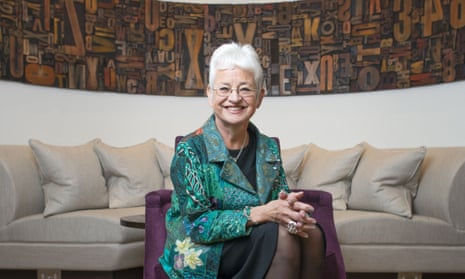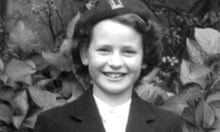When the children’s author Jacqueline Wilson met a group of care leavers in Scotland late last year, something magical happened.
Wilson was already in the middle of writing a new novel about Tracy Beaker, the eponymous hero of four best-selling books about a fierce and funny girl living in a fictional children’s home. Tracy is now in her 30s and with a daughter of her own. Wilson says that talking to some real-life care leavers about Tracy helped her to see her famous character from a new perspective.
“They thought that Tracy should be much more of an aspirational character as an adult. And they wanted her to be ultra-successful and confident, so that young people in care might think: right, if she can do this, I can do this,” says Wilson. “Some of the group I met had done very well for themselves. They were bothered by the average person’s perception of a care leaver.”
She understood their point. In My Mum Tracy Beaker, published last year, grownup Tracy was an unemployed single mum, living on a rundown London council estate. Wilson, now 73, grew up on a London council estate herself and raised her own daughter almost single-handedly. She had never thought that she could be perpetuating a negative stereotype about care leavers.
“I listened very carefully,” she says, and she decided to take on board what they had said. She asked some of them to give her feedback on the manuscript for her next book. “I felt I owed it to these young people to see what they thought.” She then incorporated many of the small changes they suggested into the final text for We Are the Beaker Girls, published next week and dedicated to the young people Wilson met.
Ashley Cameron, 29, is one of them. She was first taken into care at the age of three and she says she can easily imagine her unhappy younger self “climbing the walls with excitement” about the dedication. “I binge-read Jacqueline Wilson’s books growing up. I was in a pretty tough foster home at the time, and I saw a lot of myself in Tracy because I had a lot of behavioural issues.
“I’m so glad – and thankful – that Jacqueline’s had another look at Tracy and has come up with the book that she has,” she explains. “I know ‘happy ever after’ doesn’t always happen. But it’s just about providing that little bit of hope and inspiration for these kids who are in care now.”
In Wilson’s new book, Tracy and her 10-year-old daughter Jess (the narrator of the story) are living in a new home by the seaside. Tracy is busy running a successful antique shop and being a loving mother when a runaway foster child tears off with Jess’s ice cream. And you just know their lives will never be the same again. By the end of the book, Tracy is contemplating becoming a foster carer to this child, whose name is Jordan. “I was very interested in the idea that Tracy herself might consider fostering,” says Wilson. “I think if children have been through the care system and out the other side, sometimes that does happen.”
She also hopes the book might shine a light on the plight of runaway children who are in care. “They do often disappear for days at a time. It’s frightening to think what might have happened to Jordan in real life – if Jess and Tracy hadn’t come along.”
According to the Fostering Network, more than 65,000 children are being fostered and a further 8,600 foster families are needed in the next 12 months alone.
Wilson deliberately chose to portray, in Jordan, a teenager whose previous foster placements hadn’t worked out. She only hints vaguely at what has happened to Jordan in the past, “but it doesn’t sound as if it were great”. She felt that a difficult child who has been repeatedly let down by others wouldn’t deter Tracy. “And I thought a child like that would be the way to Tracy’s heart.”
The entire book is a homage to the work of foster carers. “There are easier ways to earn your living. And yet there’s very few ways that give so much back,” says Wilson. She also feels a lot of empathy for social workers: “It must be heartbreaking for the social workers who have to decide whether or not to take a child away from their family.”
She hopes all the children who read her books will gain an insight into what it’s like to be a foster child. “Children can be so compassionate but I think some children need it explained – in not too bossy a way – that a child doesn’t choose to look a bit unloved or to suddenly arrive in school, halfway through a term, without their mum and dad.”
She says of her latest book, “I think my biggest motivation was to prove that Tracy would be a good mum.” Wilson knows firsthand that if you don’t experience good parenting, “you’ve actually got to be a very strong person to work your way around it”. Her own parents were “not cut out to be parents”, she says: she has talked about being scared of her father’s temper and having a difficult relationship with her mother who would emotionally blackmail her. “I was determined not to be that sort of mother to my daughter.”
She wants children to see what an attentive, capable and loving mother Tracy is and to realise: “You don’t have to be stuck in whatever groove all your family were in. You can always think, well, I’m going to do things differently.”
Wilson, a former children’s laureate, acknowledges that although the representation of foster children in children’s fiction has improved since she wrote her first Tracy Beaker story 28 years ago, there is still a problem. “I think publishers are trying very, very hard to get a huge variety of characters with different backgrounds in their books. It’s just a bit of a slow process.”
If more care leavers became novelists, that might help, she says. She would love it if foster children and care leavers read her books and felt inspired to become writers themselves. Wilson says: “I think that would be splendid.”
We Are the Beaker Girls, by Jacqueline Wilson is published on 17 October
Curriculum vitae
Age: 73.
Family: Divorced, one daughter.
Education: Coombe girls school, New Malden, south London. Left school at 16 to go to secretarial college.
Career: Junior journalist for DC Thomson in Dundee for two years aged 17. Has earned her living as a writer since leaving there, aged 19, to get married. We are the Beaker Girls is her 111th book.
Awards: OBE 2002 and DBE in 2008 for services to children’s literature. Honorary doctorates from Roehampton, Kingston, Dundee, Winchester and Bath universities. Winner of the British Book Awards Children’s Book of the Year in 1999 and 2002.
Public life: Chancellor, Roehampton University; 2005-07: children’s laureate.
Interests: Reading, swimming, visiting art galleries, walking her dog.









Comments (…)
Sign in or create your Guardian account to join the discussion